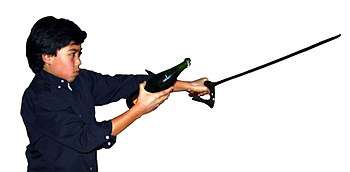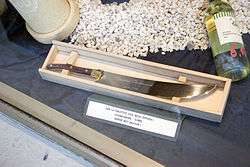Sabrage
Sabrage /səˈbrɑːʒ/ is a technique for opening a champagne bottle with a saber,[1] used for ceremonial occasions. The wielder slides the saber along the body of the bottle to break the top of the neck away, leaving the neck of the bottle open and ready to pour. The force of the blunt side of the blade hitting the lip breaks the glass to separate the collar from the neck of the bottle. One does not use the sharp side of the blade. The cork and collar remain together after separating from the neck.

History
The technique became popular in France when the army of Napoleon visited many of the aristocratic domains. It was just after the French Revolution and the saber was the weapon of choice of Napoleon's light cavalry (the Hussars). Napoleon's spectacular victories across all Europe gave them plenty of reason to celebrate. During these parties the cavalry would open the champagne with their sabers. Napoleon, who was known to have said, "Champagne! In victory one deserves it; in defeat one needs it",[2] may have encouraged this.
There are many stories about this tradition. One of the more spirited tales is that of Madame Clicquot, who had inherited her husband's small champagne house at the age of 27. She used to entertain Napoleon's officers in her vineyard, and as they rode off in the early morning with their complimentary bottle of champagne, they would open it with their saber to impress the rich young widow.[3][4]
Champagne sword

A champagne sword (sabre à champagne) is an instrument specially made for sabrage. Some swords have short blades, around 30 centimetres (12 in) long[5] and resemble large knives, although others have longer blades.[6] The edges of the blade used should be blunt—a sharpened edge is unnecessary because in sabrage it is the impact that is important.[5] If using a sword with a sharp blade then the flat blunt back of the blade is used.[7] A champagne bottle can be opened with a spoon using the same method.[8]
The bottle neck is held at an angle of approximately 20 degrees and the sword is cast down on it. The experienced sommelier can open the bottle with little loss of champagne. However, it is advised to allow a small flow in order to wash away any loose shards of glass that may be adhering to the neck. The first glass poured should also be checked for small glass shards.[8]
Physics
A champagne bottle holds a considerable amount of pressure. With early designs, bottles tended to explode and the manufacturers kept making them thicker until they could contain the pressure caused by the release of carbon dioxide during the secondary fermentation. The inside pressure of a typical champagne bottle is around 620 kilopascals (90 psi). The diameter of the opening is 18 millimetres (0.71 in), so there is a force of about 160 newtons (36 lbf) trying to push the cork out of the bottle.
At the opening of the bottle, there is a lip that creates a stress concentration. On the vertical seam of the bottle there is a thin, faintly visible, prepared seam, which creates a second stress concentration. At the intersection of the seam and the lip, both stress concentrations combine and the strength of the glass is reduced by more than fifty percent. The impact of the saber on this weak point creates a crack that rapidly propagates through the glass, fueled by the momentum of the saber and the pressure in the bottle. Once the crack has severed the top from the bottle, the pressure inside the bottle and the transferred momentum from the saber will send the top flying, typically for a distance of 5–10 metres (16–33 ft).
Records
The greatest number of champagne bottles sabered in one minute to be officially recognized by the Guinness Book of World Records is 66 and was achieved by Ashrita Furman (USA) at the Sri Chinmoy Centre, Jamaica, Queens, on 2 August 2015. Ashrita used an "Arabian sabre" with a 13-inch blade[9]. He beat the previous record of 47 held by Mirko Rainer, who managed this feat on 6 September 2014 in Mendrisio, Switzerland.
The greatest number of champagne bottles sabered simultaneously was 623. It was officially recognised a world record by an occasion of the Sciabolata del Santero in Santo Stefano Belbo in Italy on June 2016.[10]
References
- Ma, Amy (27 October 2010). "Wine 101: The Art of Sabering". The Wall Street Journal.
- "Lisa Shea's WineIntro – Basic Wine Tips, FAQS, Information". wineintro.com. Archived from the original on 22 September 2015. Retrieved 23 September 2015.
- "The Art of Sabrage". Retrieved 14 December 2015.
- US patent US8376161, Golden, Andrew P, "Novelty associated with beverages", issued 19 February 2013
- "Sabre à Champagne Selection". SabreaChampagne.Com. Retrieved 29 December 2010.
- "WKC Champagne Sword". WKC. Retrieved 29 December 2010.
- The Champagne Lounge Ltd (2014). "www.champagnesword.co.uk". Retrieved 8 February 2014.
- How To Open A Bottle of Champagne with a Spoon (Motion picture). Videojug. 8 May 2012. Retrieved 28 June 2019.
- "Most champagne/sparkling wine bottles sabered in one minute". Retrieved 21 July 2020.
- "Sciabolata a 958 Santero: record superato". Retrieved 20 July 2020.
External links
- Alton Brown shows how to Sabrage on YouTube
- Champagne sword article on Wired News
- Article in Czech